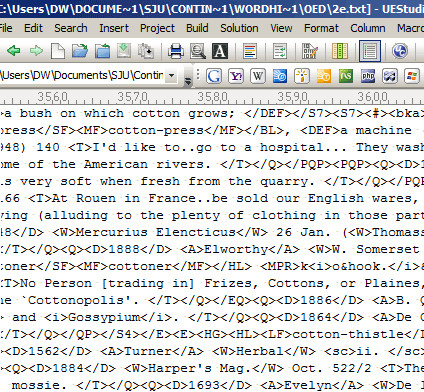Computer scientists at the University of Waterloo were responsible for digitizing the Oxford English Dictionary, 2nd edition (OED2), in the late 1980s. Initially available on CD-ROM, this eventually became the OED Online. The database has quickly replaced the printed dictionary as a first point of call for the word-curious, primarily because the extensive mark-up of entries allows for quick and sophisticated search and cross-reference functionality. The mark-up looks something like this:
You can see in this screenshot tags for, among other things, the headword “cottoner” (<HL>), various quotations (<T>), the author Turner (<A>) and his work, identified here as “Herbal” (<W>). One thing that is not marked-up, however, is the genre of the illustrative quotation, so we don’t know from the metadata here whether Herbal is a poem, a political tract, a dramatic work or a botanical encyclopedia. Asking a computer to make a good guess about this, based on the metadata (author name, work title, year and quotation text), is a lot tougher than, say, asking someone on the street to.
So, with the current OED it is easy to determine how many new word senses were first used in print by W. H. Auden (~132) but to weed out the prose quotations is laborious, and to generate a list of 20thC poetic coinages impracticable (never mind 16thC ones).

No Comments